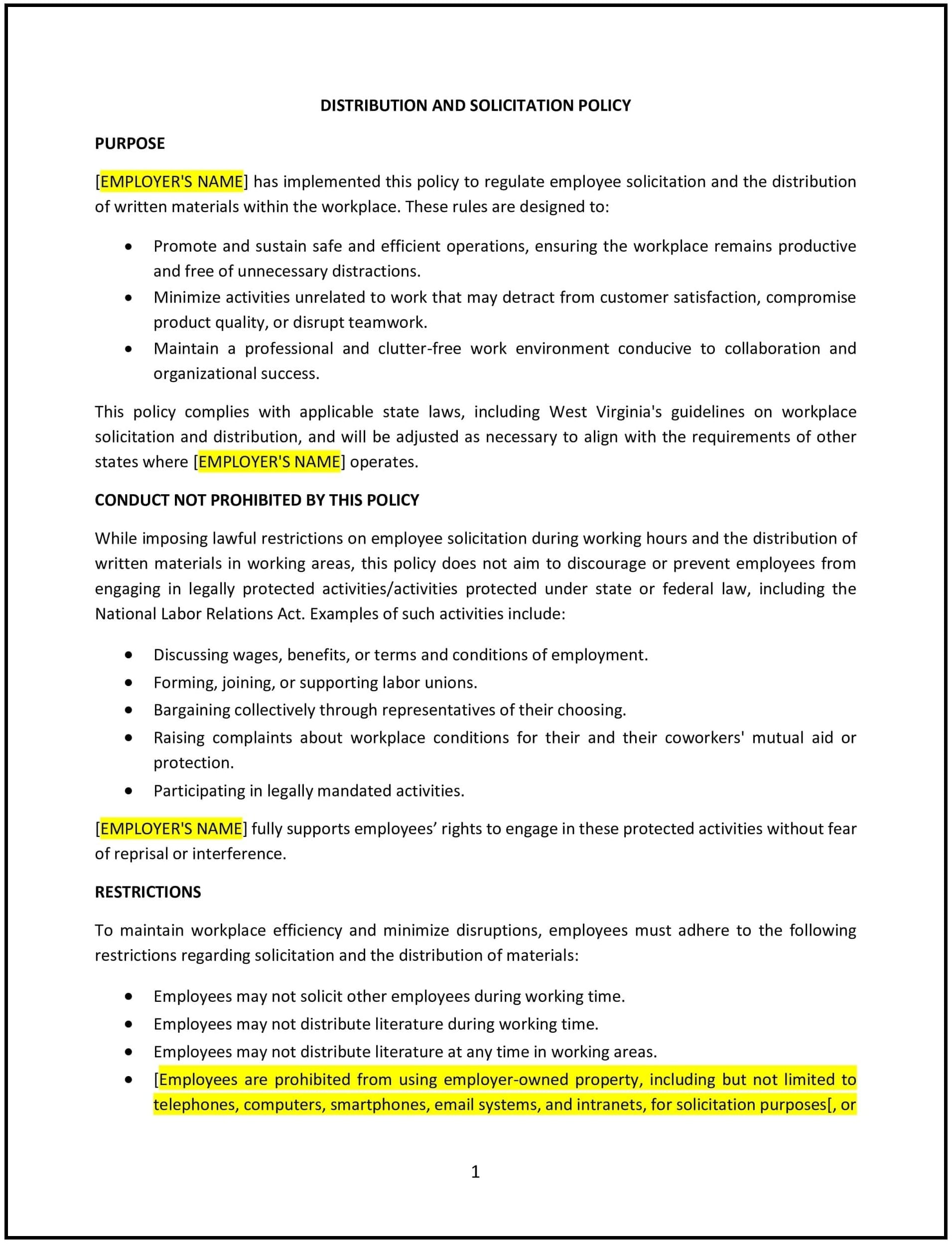Distribution and solicitation policy (West Virginia): Free template
Got contracts to review? While you're here for policies, let Cobrief make contract review effortless—start your free review now.

Customize this template for free
Distribution and solicitation policy (West Virginia)
A distribution and solicitation policy helps West Virginia businesses regulate and control activities related to distributing materials and soliciting employees, customers, or the public on company property. This policy outlines the rules for promoting products, services, and events, as well as for distributing literature or conducting solicitation for various purposes, including commercial or charitable activities, ensuring that these activities do not disrupt operations or create conflicts.
By implementing this policy, businesses can maintain a professional, safe, and respectful environment while ensuring that any distribution or solicitation activities align with company values and operational goals.
How to use this distribution and solicitation policy (West Virginia)
- Define solicitation and distribution: Clearly specify what constitutes solicitation (e.g., fundraising, political advocacy, or product promotions) and distribution (e.g., handing out flyers, brochures, or pamphlets) within the company’s premises.
- Set permissible areas for solicitation and distribution: Identify specific areas where solicitation and distribution activities may take place, ensuring that these activities do not disrupt employees, customers, or business operations.
- Establish guidelines for times and frequency: Specify acceptable times for solicitation and distribution, such as during breaks or after business hours, and establish limitations on how frequently these activities may occur.
- Specify approval processes: Require that individuals or organizations wishing to engage in solicitation or distribution seek approval from management or HR before proceeding. Outline the process for obtaining approval, including any forms or documentation required.
- Prohibit disruptive or inappropriate activities: Clearly prohibit solicitation or distribution activities that are disruptive, harassing, or that violate the company’s policies on discrimination, harassment, or the use of company property.
- Address third-party solicitation: Specify the policy for third-party solicitation (e.g., outside vendors or charities) and whether such activities are allowed on company property or need special permission.
- Ensure compliance with local, state, and federal laws: Make sure the policy complies with applicable laws related to free speech, labor regulations, and any other relevant rules governing solicitation and distribution in public or private spaces.
Benefits of using this distribution and solicitation policy (West Virginia)
This policy offers several benefits for West Virginia businesses:
- Maintains a professional environment: Ensures that solicitation and distribution activities do not interfere with work or disrupt employee productivity, maintaining a professional atmosphere in the workplace.
- Prevents conflicts: Establishes clear guidelines that help prevent conflicts between employees, customers, and third parties involved in solicitation or distribution activities.
- Protects company property: Helps ensure that company property is not used improperly for unauthorized promotional or fundraising activities.
- Promotes fairness: Ensures that any solicitation or distribution activities are handled fairly and consistently, providing equal opportunities for employees and external organizations while respecting their rights.
- Improves legal compliance: Helps the business stay compliant with relevant local, state, and federal regulations concerning solicitation, free speech, and business operations on company property.
Tips for using this distribution and solicitation policy (West Virginia)
- Communicate the policy clearly: Ensure all employees are aware of the policy and understand the guidelines for distributing materials and engaging in solicitation activities.
- Be consistent: Apply the policy consistently to all employees, customers, and third parties to avoid perceptions of favoritism or bias.
- Monitor compliance: Ensure that solicitation and distribution activities are monitored to ensure that they align with company guidelines and that violations are addressed promptly.
- Review regularly: Regularly review the policy to ensure that it aligns with changes in company practices, local regulations, or industry standards.
- Provide training: Consider providing training to managers and HR personnel on how to enforce the policy effectively and handle solicitation or distribution requests appropriately.